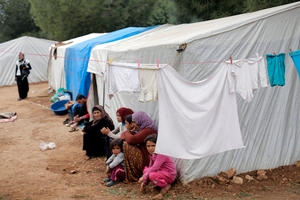Research
Research Tests Rhetoric About Syrian Refugees: Its Political Impact in Question

Izmir, Turkey - March 02, 2016: Syrian people in refugee camp in Izmir, Turkey
As people displaced by war and violence seek refuge, some countries open their borders with compassion while others view the influx of outsiders as a threat.
Thomas Zeitzoff, co-director of AU School of Public Affairs' Peace and Violence Research Lab, and colleagues recently examined attitudes toward Syrian refugees in Turkey - the largest host country of Syrian refugees - and how messages about their presence impacted the local political landscape. His research revealed that fundamental factors, such as partisanship and previous exposure to conflict, were stronger predictors of citizens' attitudes toward the country's peace process than negative messages about refugees.
"It's kind of encouraging," says Zeitzoff, who is also assistant professor at SPA. "Yes, in some places it may be easy to stir up resentment towards refugees or other groups that are different, but other things drive the conflict."
Zeitzoff's paper, "Refugees, Xenophobia, and Domestic Conflict: Evidence from a Survey Experiment in Turkey," coauthored by Anna Getmasky of the University of Essex in the United Kingdom and Tolga Sinmazdemir of Bogazici University in Turkey, will appear in an upcoming issue of the Journal for Peace Research.
Zeitzoff and his coauthors surveyed Kurds and non-Kurds in border regions in Turkey to assess their reaction to various information provided about refugees. In the survey design, some heard negative messages that portrayed refugees as an increased economic burden and disruptive to the ethnic balance in the country. Others received positive information emphasizing how Turkey was saving innocent women and children by welcoming refugees. The 1,237 respondents were then asked about their sympathy toward different groups of refugees, their view of refugees as a threat, and support for the Turkish-Kurdish peace process.
"Some argue that refugees destabilize hosting countries and lead to increased conflict," says Zeitzoff. "Often people don't like others who are different, but while negative messages about refugees may lead to increases in xenophobia towards the refugees, we didn't find support for the idea that these attitudes translate into increased support for domestic conflict in the host country (i.e., it did not affect attitudes towards the peace process)."
Zeitzoff and his colleagues chose Turkey for this study because it is the largest host of Syrian refugees, numbering one million when he traveled there in the summer of 2014 for the research and now over three million. While much attention has been paid to the impact of Syrian refugees in Western Europe, the vast majority reside in neighboring countries such as Turkey, Lebanon, and Jordan, he notes.
The researchers discovered that attitudes toward refugees did not have an effect on support for the peace process. While the study focused on Turkey, Zeitzoff says it can help provide insight on tensions toward immigrants elsewhere — including the United States. Although President Donald Trump has offered negative views on refugees, his speech may have limited impact. Hearing negative portrayals of refugees alone may not be enough to get people activated or change their fundamental beliefs.
"A lot of times, maybe elite rhetoric is not overwhelming the public but rather tapping into some pre-existing views," says Zeitzoff.
